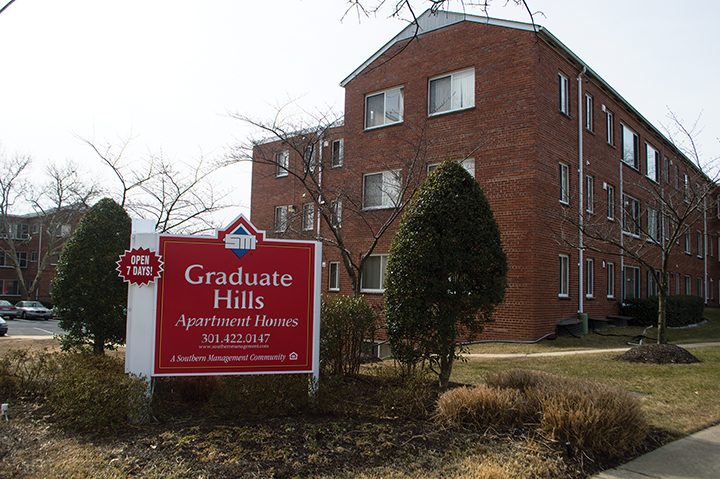A newly formed Graduate Student Government task force is directing an effort to improve options for affordable graduate housing in the College Park area.
The task force, composed of five students, formed after many graduate students grew frustrated with high rents and a lack of graduate-friendly housing options near the University of Maryland’s campus, said David Ampofo, a psychology doctoral student. Graduate Hills is the only designated graduate housing unit partnered with this university, said Jennifer Lindstrom, the coordinator for off-campus housing services. The monthly rental rate starts at $1,018, which isn’t a viable option for many of the graduate students who are living off of stipends, Ampofo said.
This university’s minimum stipend for a nine-and-a-half month graduate assistantship is $16,144, according to the Office of Research Administration’s website. Average stipend amounts in 2013 were $17,840 for a nine-and-a-half month assistantship, according to data from former Graduate School Dean Charles Caramello.
Although individual departments are encouraged to supplement these stipends, many graduate students are not left with enough money post-taxes to afford a four-figure monthly rent, Ampofo said.
Moreover, graduate students often are “more diverse in age and needs than undergraduates,” Lindstrom said.
“They’re older,” Lindstrom said. “Sometimes they have families. A lot of times with graduate students, their searches look more similar to [that of] a full-time professional.”
This, coupled with low stipends, leads many graduate students to live farther from the campus in search of affordable housing, Ampofo said. However, many have complained Shuttle-UM has odd hours of transit, long wait times between buses and doesn’t link to some of the major graduate housing spaces, said Stephanie Cork, GSG’s president.
One of the task force’s proposed solutions is to have a pass for this university that allows students to have unlimited Metrobus and Metrorail rides for a discounted price, Ampofo said. American University piloted a similar program, which launched this semester, financed by a mandatory $130 student fee.
With the decrease in parking spaces on the campus in recent years, more graduate students rely on public transportation instead of driving cars, Ampofo added.
“It’s kind of a juggling act where you’re living in a place that’s cheaper, but you have to commute as well,” Ampofo said. “It would definitely take a burden off those individuals near the Metro line.”
The task force is also reaching out to local management companies, such as Southern Management Corporation, to offer discounted rates to graduate students. They are meeting with the owners of Fuse 47, a new apartment complex opening this spring on Berwyn House Road, to negotiate a “more competitive rate,” Ampofo said.
Members of the task force are in discussions with Co-op Housing University of Maryland, which strives to create affordable housing options in the College Park area, about setting up a housing cooperative specifically for graduate students, Cork said.
Long-term, the task force hopes to convince developers to create more housing spaces near the campus designated for graduate students by working with city officials and this university’s administration, Ampofo said.
“It requires persistence and determination from the graduate students and the university,” said Xu Han, a public policy doctoral student. “One thing that we can work with them is to promote awareness of the importance of affordable housing, because we need support.”



